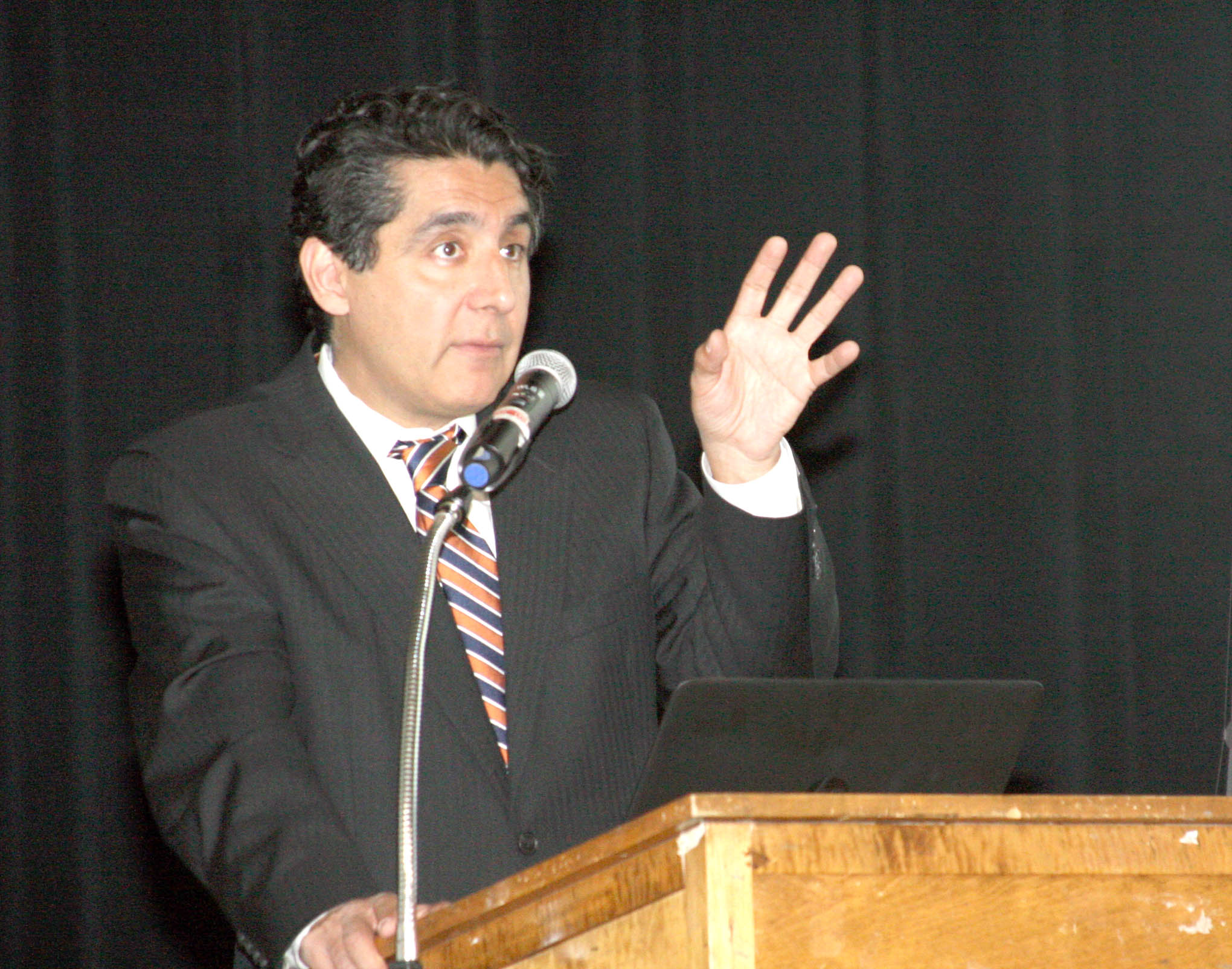College News
CCCC students hear lecture from UNCG's Dr. Ali
Notice: This article is older than 12 months. Names, contact information, programs, titles, etc. might have changed. If you have any problems please call the main college number, 1-800-682-8353, and we will be happy to direct you accordingly.

click image to enlarge ⊗
Dr. Omar H. Ali, of The University of North Carolina at Greensboro, spoke on 'The Many Faces of Islam: ... (more)
05.02.2019 • College & Community • College General • Students/Graduates
SANFORD - "If there's one important thing that you come away with today, it's that there is not one single Islam." That is how Dr. Omar H. Ali began his lecture at Central Carolina Community College that touched on forces shaping the faith and its perception worldwide.
Just to make the point, the award-winning historian asked everyone who identified themselves as Christian to raise their hands, and about two-thirds of the audience did. Ali used that as a starting point to note the many different kinds of Christian denominations and backgrounds. Applying that insight to a faith that many people still see as rigid and uniform, Ali concluded, "Islam is not one thing."
Ali specializes in the African Diaspora, Islam and independent political movements at The University of North Carolina at Greensboro, where he also serves as dean of the Honors College. He received his Ph.D. from Columbia University, has taught at universities across the Americas and was named the 2016 Carnegie Foundation North Carolina Professor of the Year.
"The Many Faces of Islam: Behind the Headlines," his presentation on April 11, was designed to demystify the religion and correct some common misunderstandings. He gave a brief history, describing the birth of Islam and showing how it and other early religions spread initially through military conquests and later through the impact of commercial trade.
But the focus was on the broad diversity within the world's second-largest religion, one that includes about 7 million people in the United States and 1.7 billion worldwide.
"Islam from the very beginning was pluralistic; it had many different threads within it," he said before listing a few of them. "But as it grew, it would take on the characteristics of the people and places into which it entered."
Despite different practices in countries around the world, what people see in the media about Islam focuses almost entirely on what Ali described as "scary stories." That combines with a general misunderstanding of some cultural practices, like traditional clothing, to create misunderstanding and fear. "If you're constantly being fed the message that Muslims are scary and violent," Ali said, "it's not surprising that people would feel that way."
And what's worse, he said, is that fear keeps people from reaching out and learning about each other.
Immediately after being introduced, Ali joked that everything in his biography was accomplished so he could get in front of audiences and have conversations with people. And that's exactly what he did during the second half of his hour-long presentation, when about 70 college transfer students studying subjects ranging from communication and education to humanities and social sciences asked for his perspective.
The first question: Has he ever felt that same kind of fear? (Yes, he said, because we all internalize the culture we share.) Was Islam spread in the transatlantic slave trade? What kind of educational approach in elementary and middle schools might help people understand Islam better? And there were many more.
Each time, the scholar gave a thoughtful, direct answer, but then threw the conversation back, often by asking, "What do you think?" That approach usually generated a few volleys back and forth before everyone moved onto the next question.
CCCC Social Sciences Lead Instructor Bianka Stumpf invited Ali to campus as part of the college's annual Academic and Cultural Enrichment Series. She said that kind of discussion is what she hopes for -- not only during the lecture, but after it's over and then back into the classroom.
After the lecture ended, a group of students quickly huddled around Ali at the front of the Dennis A. Wicker Civic & Conference Center auditorium, asking about points he made during the presentation and raising a few new topics.
Ali's appearance was made possible by funding from the North Carolina Humanities Council, a statewide nonprofit and affiliate of the National Endowment of the Humanities.
To learn more about Central Carolina Community College, visit www.cccc.edu.
Categories
- Admin, Faculty & Staff Category
- Arts & Entertainment Category
- Clubs Category
- College & Community Category
- College General Category
- Continuing Education Category
- Curriculum Programs Category
- Distance Education Programs Category
- Facilities/Buildings Category
- Finances Category
- Foundation Category
- Graduations Category
- Lee Early College Category
- NCCCS Category
- SGA Category
- Special Events Category
- Sports Category
- Students/Graduates Category
- Uncategorized Category
Archives

